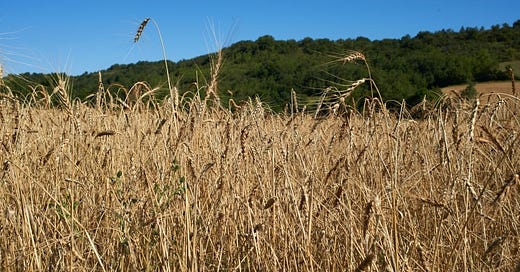(Photo by Alain Pitton/NurPhoto via Getty Images)
Russian President Vladimir Putin began bolstering his nation’s agricultural production following the “Crimea Spring” of 2014 in response to European sanctions. Russia has since dramatically increased domestic agricultural production, instituting counter-bans and replacing imports with domestic production. Russia is the world’s largest exporter of grain, boosting its economy while America’s wheat production has steadily declined. Russia and China have made headlines over joint naval exercises with Iran, but China’s recent rejection of deliveries of US wheat threatens an agricultural trade alliance that may prove even more deadly.
The Russian Bear Is Bull on Wheat
China may simply be taking advantage of lower prices for Russian wheat and its gorilla power to dominate markets as it stockpiles food reserves. Russia continues to boost production of most agricultural commodities, having invested in agricultural equipment, preferential leasing for food processing equipment, and loans to farmers through the state-owned agricultural bank Rossel’khozbank, created in 2000.
As reported by the USDA, the result is that “…Russia has transformed its agriculture sector from a modest level of production in the 2000s to a significant contributor to the economy and growing global player.” This market power is augmented by the ruble’s decline of some 15% relative to the US dollar, which makes Soviet wheat even more attractive to the Red Dragon.
China Ixnays Massive Deliveries
US commodities markets shuddered when China canceled deliveries totaling 504,000 metric tons of US soft red winter wheat over three consecutive trading sessions (March 7, 8, and 11). While not a substantial percentage of the US crop, this is the largest cancelation ever by the Chinese and follows a similar cancelation of corn shipments in 2023.
The corn and wheat snubs are not a consequence of reduced Chinese demand. The country imports grains for its population and suffered a devastating loss of domestic wheat production due to heavy rains last year. Cheaper crops from South America, which enjoyed a bumper year, may also impact the decision. Yet some observers are attributing the shift to politics rather than market conditions.
A Geopolitical Shift?
China has purchased massive amounts of US grains, including wheat, for decades. Yet Beijing and Moscow have moved closer in recent months, in an alliance fueled by a shared enemy in a bellicose US. Biden’s Ukrainian nation-building has seeded a shift in such allegiances while fueling Putin’s push to subsidize even more food exports. Europe’s agricultural production is in climate-change turmoil. It seems the Soviet Union and China learned lessons from state-sponsored famines in their own countries under Stalin and Mao: Biden likely forgot.
Just as Putin reacted boldly against European sanctions after the Crimean Spring, he has shifted relations and production away from the United States and seeks new trade partners: China is the big sell. Putin may be shrewdly courting China to undermine the US economy and bolster Sino-Russian fraternity.
Dagens.com reported that the move is connected directly to Vladimir Putin’s improved diplomatic ties with China:
“….during President Putin’s last visit to China, he signed a long-term contract for the supply of Russian agricultural products to China. NetEase observers believe that China’s rejection of American wheat stems from increased imports from Russia. Given the unfriendly stance of the U.S. towards China, Beijing sees no reason to continue purchasing grain from America, opting instead for Russian supplies.”
If true, this frightening possibility is alarming. In a free market, China may of course buy wheat from whomever it wishes. But the Dragon often eats fair market practices for breakfast, including its penchant for infringing intangible property rights, spying, stealing trade secrets, and reneging on contracts. Should the Chinese decide to play soft economic warfare against the US or the West, a trade alliance with Russia could undermine the US economy, up-end established markets, and unleash a vicious cycle of sanctions and financial retribution.
(Photo by: Bernard Friel/Education Images/Universal Images Group via Getty Images)
This is especially so in the case of food. Chinese companies have established footholds around the globe to secure food supplies for their massive population while the nation develops the industrial agriculture needed to transition millions of Chinese off peasant plots. Chinese interests own American farmland and significant holdings in US pork and other agricultural producers. Might Chinese companies direct sales of US-sourced products to Russia, driving up US domestic food prices? Already American soils in Arizona and California slurp up massive quantities of precious US water from declining aquifers to ship bales of hay to Chinese milk cows and UAE Arabian horses.
Other indicators suggest cause for concern. Iran is now shipping chicken eggs to Russia, as stronger economic ties between those nations also extend to food. Ivan Grachev, chief researcher at the Central Economics Institute of the Russian Academy of Sciences, recently wrote:
“One of the last hopes of Russia’s detractors is that Xi Jinping could stop supporting Putin. But China’s demand for Russian raw materials will grow. Cooperation with the Celestial Empire is one of the factors thanks to which our country is guaranteed economic growth in the near future…”
A Food OPEC?
In his brilliant 1986 study of Stalin’s forced starvation of millions of Ukrainian and Russian kulaks (peasant farmers), Robert Conquest chronicled a horrifying genocide inflicted without bullets or tanks. Conquest warned: “In a jungle full of totalitarian monsters liberal democracy needs teeth.” Many Americans are battling the new jungle of totalitarian monsters, including the World Economic Forum, the World Health Organization, and Joe Biden’s war on MAGA.
America should tend to its back garden: That is part of liberal democracy’s “teeth.” The Biden administration has brashly undermined US oil pipelines and leases, spiking fuel prices that directly impact domestic food prices: There are no electric tractors to harvest US wheat at scale. His environmental policies have hampered farmers in favor of dubious eco-causes. His hawkish saber-rattling has undermined established trade relations in a time when Americans dine on more imported food. Meanwhile, China’s influence extends to South America and Africa, where it controls resources necessary for American commerce to function.
The Organization of Petroleum Exporting Countries (OPEC) embargo of the 1970s sent the US economy reeling, as Americans waited in long lines to buy precious gasoline. Warfare throughout time has required food for soldiers, or employed famine against enemies. It may cost China economically to compromise its ties with America, but like Russia, it continues to establish new supply lines to counter Western hegemony. It is always less risky to starve one’s enemies (not just of food but of microchips, diesel exhaust fluid, rare earth materials, or other essentials) rather than throw human lives (and expensive aircraft carriers) at the citadel walls. Today, America faces BRICS: a geopolitical alliance of Russia, Iran, China, UAE, India, Ethiopia, Brazil, South Africa, and Egypt. That’s a lot of food commerce!
Russia may believe that the Biden administration was complicit in the demolition of its gas pipeline. If so, exploding America’s international food pipeline – above water, in plain sight, with no bombs – may seem like a fine chance for retribution. China and Russia (and perhaps Brazil) could join forces to inflict a massive economic squeeze on naive America, threatening food scarcity and rapid inflation in the nation that was once the bread basket of the world. Robert Conquest observed: “To congratulate oneself on one’s warm commitment to the environment, or to peace, or to the oppressed, and think no more is a profound moral fault.” Clueless “social justice” ideology feeds not the soil or human beings, but a deluded and unrealistic vulnerability that may one day sow its own harvest of sorrow.
(Previously published at Liberty Nation.)







chUCK Fina
I meant food supply of course. Some days my fat thumbs are a real problem. LOL